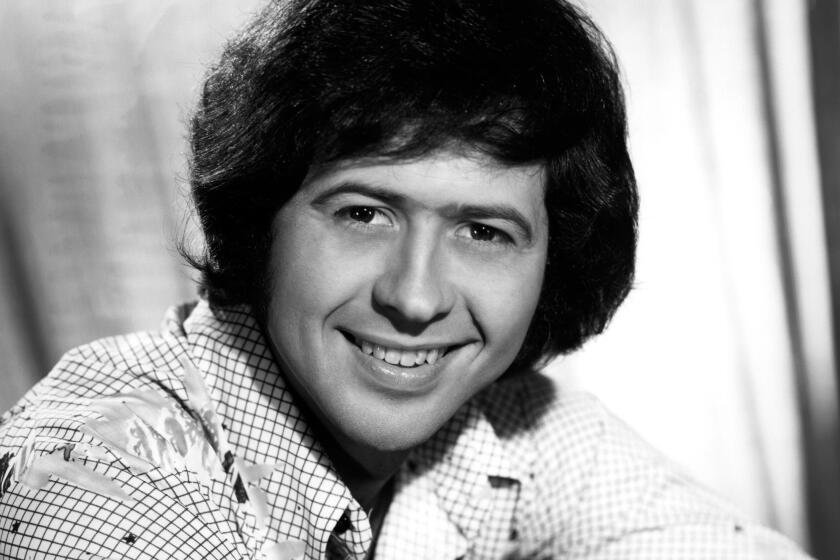Sam Moore, half of ’60s R&B duo Sam & Dave, dies at 89

- Share via
Sam Moore, who as half of the 1960s R&B duo Sam & Dave sang gritty but hook-filled hits including “Soul Man” and “Hold On, I’m Coming,” died Friday in Coral Gables, Fla. He was 89.
His death was confirmed by his publicist, Jeremy Westby, who said the cause was complications from an unspecified surgery. Dave Prater, Moore’s partner in Sam & Dave, died in a car accident at age 50 in 1988.
With Moore as the tenor and Prater as the baritone, Sam & Dave were one of the signature acts at Memphis’ Stax Records, which offered a tougher, sweatier alternative to the more polished R&B sound that Detroit’s Motown had turned into pop gold.

Yet Sam & Dave were no strangers to the charts: In 1965, they kicked off a four-year run in which they reached the top 40 of Billboard’s R&B chart a dozen times and hit No. 2 on the all-genre Hot 100 with “Soul Man,” which was written and produced by Isaac Hayes and David Porter and featured backing by Stax’s crackerjack house band, Booker T. & the M.G.’s. “Soul Man” won a Grammy Award in 1968, beating Marvin Gaye and Tammi Terrell’s “Ain’t No Mountain High Enough” and Smokey Robinson and the Miracles’ “I Second That Emotion” to be named best R&B performance by a duo or group with vocals.
Among Sam & Dave’s other hits were “I Thank You,” “You Don’t Know Like I Know,” “Said I Wasn’t Gonna Tell Nobody,” “Something Is Wrong with My Baby” and “You Got Me Hummin’,” which a teenage Billy Joel went on to cover with his group the Hassles.
“Most bands … could get away with doing a lousy version of a Sam & Dave record and still get an incredible reaction to it,” Joel said when he inducted the duo into the Rock & Roll Hall of Fame in 1992. “But they all suffer when you compare them to the original.”
The 81-year-old songwriter and composer is the subject of a new biography by former Times pop music critic Robert Hilburn.
For all they accomplished in the studio, Sam & Dave were perhaps most highly regarded as an explosive live act, one known as both Double Dynamite and the Sultans of Sweat.
Samuel David Moore was born in Miami on Oct. 12, 1935, and grew up singing in the church. He met Prater at Miami’s King of Hearts nightclub in the early ’60s when Prater performed at an amateur night that Moore was hosting. The two formed Sam & Dave and toiled mostly in obscurity until Ahmet Ertegun, Jerry Wexler and Tom Dowd — the creative brain trust behind Atlantic Records — caught their show and signed the duo to a deal that had them recording for Stax, which Atlantic was distributing.
Moore and Prater, whose relationship was always more professional than friendly, broke up in 1970 but reunited after each man’s solo career fizzled. In 1978, the Blues Brothers — comedians John Belushi and Dan Aykroyd — released a cover of “Soul Man” that went to No. 14 on the Hot 100; the renewed attention propelled Sam & Dave for a few more years until they played their final gig together in San Francisco on New Year’s Eve in 1981. (To Moore’s chagrin, Prater later toured as Sam & Dave with a different singer, Sam Daniels.)
In 1982, Moore married Joyce McRae, who also began managing his career and helped him overcome an addiction to heroin. He went on to sing on albums by Don Henley and Bruce Springsteen and received a lifetime achievement award from the Recording Academy in 2019.
“Over on E Street, we are heartbroken to hear of the death of Sam Moore, one of America’s greatest soul voices,” Springsteen said Saturday on Instagram. “He was filled with stories of the halcyon days of soul music, and to the end had that edge of deep authenticity in his voice I could only wonder at.”
“RIP Sam Moore,” Springsteen sideman Steve Van Zandt posted on X. “Him and Dave Prater were the inspiration for me and Johnny to start Southside Johnny and the Asbury Jukes. An important righteous wonderful man.”
In 1993, Moore was among numerous artists who pressed legal claims that the record industry had cheated them out of retirement benefits. Moore and other artists sued multiple record companies and the American Federation of Television and Radio Artists.
Moore told the Associated Press in 1994 that he joined the legal effort after learning, despite his million-selling records, his pension amounted to just $2,285, which he could take as a lump sum or in payments of $73 monthly.
“Two thousand dollars for my lifetime?” Moore said then. “If you’re making a profit off of me, give me some too. Don’t give me cornbread and tell me it’s biscuits.”
“I did a lot of cruise ships, I did a lot of oldies shows,” during those struggles, he said, adding that he once opened for a group of Elvis impersonators.
“That’s funny to think back to it now. And I did a lot of shows where … I had to actually audition,” he said. “But you know what? You keep your mouth shut and you get up there and you sing as hard and perform as hard as you can, and get the little money and go on about your business and try and pay those bills. I’m laughing about it now, but at that time, man, it was really serious.”
Moore’s survivors include his wife, their daughter and two grandchildren.
The Associated Press contributed to this report.
More to Read
The biggest entertainment stories
Get our big stories about Hollywood, film, television, music, arts, culture and more right in your inbox as soon as they publish.
You may occasionally receive promotional content from the Los Angeles Times.











